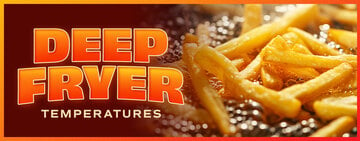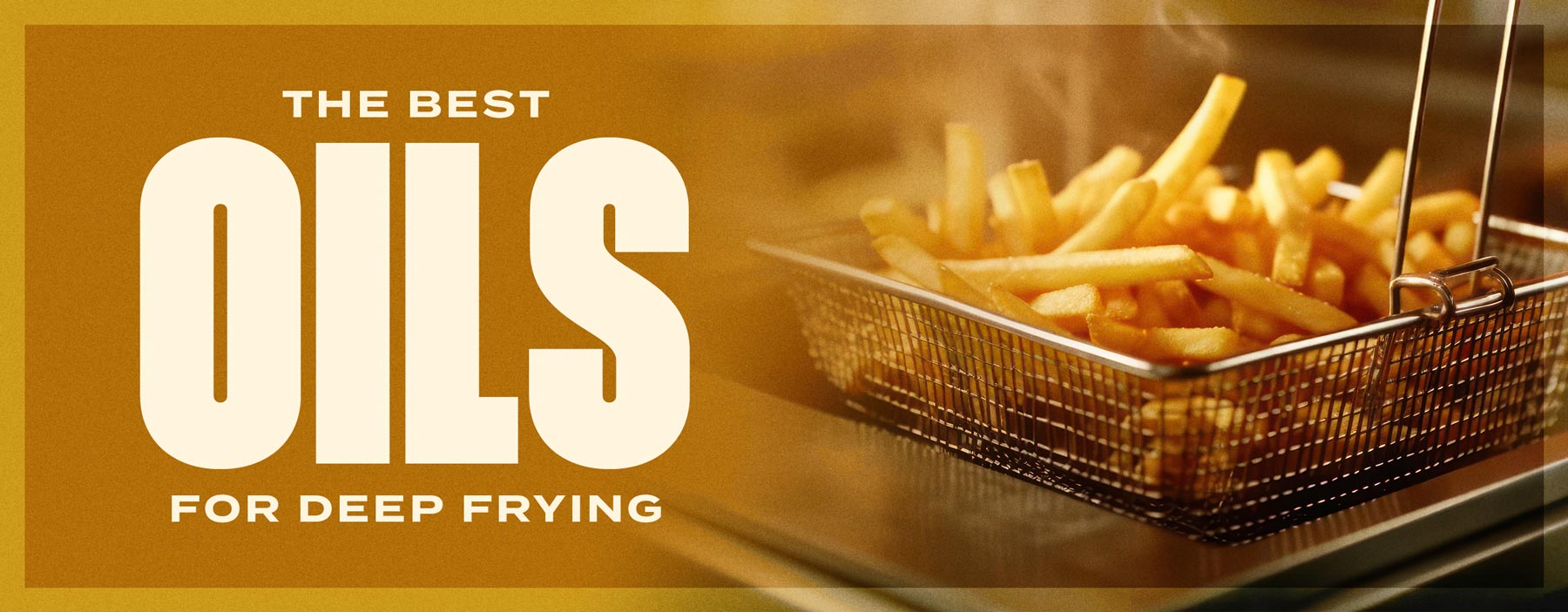
Choosing the Best Oil for Your Commercial Deep Fryer
Last updated on Apr 24, 2025When it comes to deep frying, choosing the right oil is crucial for kitchen safety and for creating delicious fried foods. Different cooking oils have a range of smoke points and flavors, making it important to consider these factors when selecting the best oil. Also, keep in mind that a commercial deep fryer holds several gallons of oil. Delicate oils that are expensive and break down quickly with heat will not be efficient or cost-effective for deep frying. Keep reading to learn more about the best oils for your deep fryer.
Shop Cooking OilWhat Is the Best Oil for Deep Frying?
Vegetable oil and canola oil are two popular types of oil used for commercial deep frying because of their high smoke points. Which oil is the better option? Canola oil is often favored because of its neutral flavor, low saturated fat content, and balanced fatty acid profile. Vegetable oil, on the other hand, provides a more affordable and versatile option. It’s important to note that products labeled as “vegetable oil” are a blend of different plant oils and may contain canola, soybean, corn, or sunflower oil. Refer to the product label for the exact ingredients and the accurate smoke point.
How to Choose the Right Oil for Your Deep Fryer
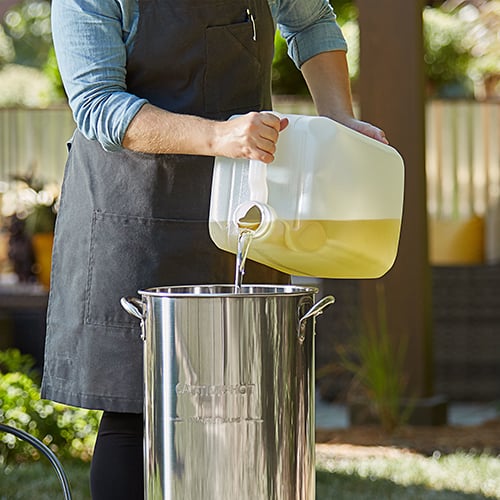
When it comes to choosing an oil for your commercial deep fryer, there are several factors that you should consider. Each oil has its own set of characteristics, and understanding these factors will help you make an informed decision for your frying needs.
- Smoke Point: The smoke point of an oil refers to the temperature at which it starts to break down and produce smoke. Oils with higher smoke points are ideal for deep frying because they can withstand higher temperatures without burning. Some common oils with high smoke points include peanut oil, canola oil, and safflower oil. These oils are suitable for high-heat cooking and provide a crispy texture to fried foods.
- High Heat Stability: Deep frying requires heating the oil to high temperatures, so it is crucial to choose an oil that can withstand these heat levels without breaking down or oxidizing. Oils with high levels of monounsaturated fats, such as canola or peanut oil, are more heat stable and better suited for deep frying.
- Neutral Flavor: The choice of oil can greatly impact the flavor of your fried foods. While some oils have a neutral taste, others impart a distinct flavor to the food. For example, peanut oil adds a rich and nutty flavor, while olive oil provides a fruity and robust taste. It is essential to consider the flavor profile you desire for your dishes and choose an oil accordingly.
- Fat Content: Deep frying is often associated with unhealthy eating habits, but selecting the right oil can make a difference. Oils high in saturated fats, such as coconut oil or palm oil, are not the healthiest options for deep frying. Instead, opt for oils with healthier fat profiles, such as canola oil or sunflower oil, which are lower in saturated fats and higher in monounsaturated fats.
- Cost: The cost of oil can be a significant factor, especially for commercial establishments that use large quantities of oil for deep frying. Some oils, like peanut oil or avocado oil, can be more expensive compared to others. Consider your budget and the volume of deep frying you anticipate to determine the most cost-effective option.
- Allergies: It is essential to be mindful of potential allergens when selecting an oil for deep frying. Peanut oil is a popular choice due to its high smoke point and excellent flavor, but it can be problematic for individuals with peanut allergies. If allergies are a concern, consider using alternative oils like canola oil or soybean oil, which are generally safe for most individuals.
Best Oils for Deep Frying
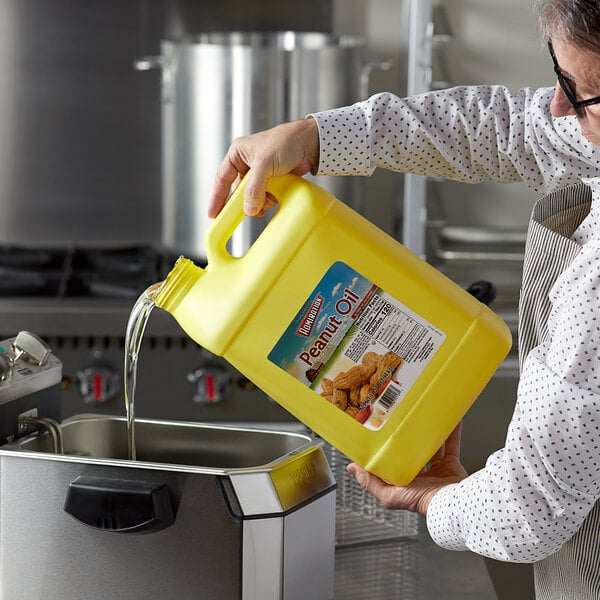
We'll take a closer look at the best types of deep-frying oils and describe their benefits below:
1. Peanut Oil
Peanut oil has a mild, nutty flavor that enhances the taste of fried foods without overpowering them. Not all peanut oils are considered an allergen, but it's recommended to avoid this product completely if you have a severe peanut allergy. Make sure to label your menu accordingly if you use peanut oil in your commercial kitchen.
- Flavor: Mild and nutty
- Smoke Point: 425 to 450 degrees Fahrenheit
- Cost: Slightly more expensive than some other oils
2. Canola Oil
Canola oil is a neutral-tasting oil that allows the natural flavors of the food to shine through. It's also more affordable compared to other oils, making it a cost-effective option for commercial deep frying.
- Flavor: Neutral
- Smoke Point: 350 to 400 degrees Fahrenheit
- Cost: Affordable
3. Soybean Oil
Soybean oil is one of the most economically priced oils available, making it a cost-effective option for commercial deep frying. Its wide availability also ensures that businesses can easily source it in large quantities, ensuring a steady supply for their frying needs.
- Flavor: Neutral
- Smoke Point: 400 to 450 degrees Fahrenheit
- Cost: Affordable
4. Sunflower Oil
Sunflower oil's high smoke point ensures that it can withstand the heat without breaking down and compromising the quality of the food. This means that you can achieve crispy and golden results without the fear of the oil becoming rancid or imparting a burnt taste to your dishes.
- Flavor: Mild flavor
- Smoke Point: 440 to 450 degrees Fahrenheit
- Cost: Affordable
5. Cottonseed Oil
Cottonseed oil is also a versatile option for commercial deep frying due to its ability to withstand repeated use. The oil's high smoke point and stability allow it to be reused multiple times without compromising the quality of the fried food or the oil itself. This can help to reduce overall costs and waste in a commercial kitchen.
- Flavor: Mild nutty flavor
- Smoke Point: 420 degrees Fahrenheit
- Cost: Generally affordable
6. Avocado Oil
In terms of flavor, avocado oil has a mild and pleasant taste that does not overpower the food being fried. It's generally more expensive compared to other frying oils, but its numerous benefits can make it a worthwhile investment for the right commercial kitchen.
- Flavor: Mildly sweet and buttery
- Smoke Point: 520 degrees Fahrenheit
- Cost: More expensive compared to other deep frying oils
7. Blended Vegetable Oils
Vegetable oil is one of the most convenient oils to use for deep frying because of its affordability and versatility. You will find that most vegetable oils are a blend of soybean, canola, corn, or sunflower oils.
- Flavor: Neutral
- Smoke Point: 400 to 450 degrees Fahrenheit
- Cost: Affordable
- Extra Virgin Olive Oil: One type of oil that is not recommended for deep frying in a commercial deep fryer is extra virgin olive oil. Although extra virgin olive oil is a popular choice for sauteing and dressing salads due to its rich flavor and health benefits, it has a low smoke point of around 320 degrees Fahrenheit. When heated beyond its smoke point, extra virgin olive oil can break down and release harmful compounds, resulting in a bitter taste.
- Coconut Oil: Although it has gained popularity in recent years, coconut oil may not be the best choice for deep frying in a commercial setting. While coconut oil has a high smoke point and imparts a subtle flavor to fried foods, it can be expensive compared to other oils commonly used in commercial kitchens.
- Butter or Margarine: While these fats may add a rich and flavorful taste to certain dishes, they have a low smoke point and tend to burn easily. This can result in a greasy and unpleasant taste, as well as potential fire hazards in a busy commercial kitchen.
- Flaxseed, Walnut, and Sesame Oil: These oils are not recommended for deep frying in a commercial deep fryer. They have distinct flavors that may not be suitable for all types of fried foods, and their low smoke points make them susceptible to burning at high temperatures. Instead, use these oils in applications where their flavors can shine through, like finishing dishes and dressing salads.
Cooking Oils to Avoid When Deep Frying
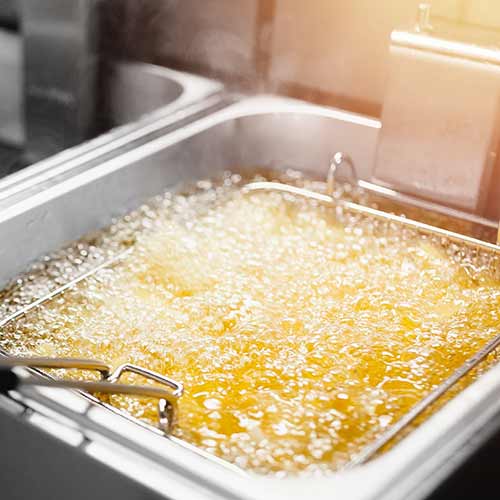
While some oils may be suitable for cooking methods like pan frying or sauteing, they may not be the best choice for deep frying in a commercial deep fryer. You'll need several gallons of oil to fill the tank on your deep fryer, so consider affordability. The oil also needs to remain stable at high temperatures and have a high smoke point. These are oils to avoid using in your deep fryer:
Deep Fryer Oil FAQ
We answer common questions about deep fryer oil below:
What's the Best Oil for Deep Frying French Fries?
Peanut oil is one of the most popular oils for deep frying french fries. Many cooks claim that it makes french fries extra crispy and gives them a nutty flavor.
How Can I Extend the Life of My Fryer Oil?
In a busy restaurant, one of the key factors in making your deep fryer oil last longer is proper maintenance and care. Regularly filtering the oil and removing any food particles or debris will help extend its lifespan.
How Often Should I Change My Fryer Oil?
In a busy restaurant, the frequency of changing fryer oil is crucial to maintaining the quality of your fried foods. On average, fryer oil should be changed once or twice a week. This can vary depending on factors like the type of food being fried, the temperature at which it is fried, and the frequency of deep frying. Regularly monitoring the oil's color, smell, and taste can also help determine when it needs to be changed.
What Should I Do With Used Oil?
To ensure proper grease disposal, it is important to follow the guidelines set by local health departments. One popular method is to work with a local recycling company that specializes in used cooking oil. They can provide regular pickups and ensure that the oil is properly recycled into biodiesel or other useful products. By implementing these practices, busy restaurants can effectively manage their deep fryer oil while also being environmentally conscious.
Back to TopWith so many cooking oils on the market, it can be tough to choose the right one for your deep fryer. If you are marketing a healthy menu, avocado oil might be a good choice for your business. For the most convenient and affordable options, tried-and-true cooking oils like vegetable and canola will produce consistent results and need to be replaced less often.



